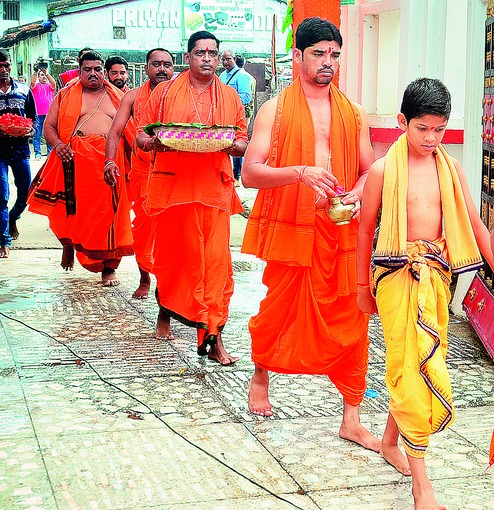
Bhubaneswar, Aug. 26: What Onam is to the people of Kerala, Pongal to Tamils and Baisakhi to Punjabis, Nuakhai or Navarna is to the people of west Odisha.
Nuakhai, the annual harvest festival, started with Brahman Mahasabha by serving the first crop of the harvest to goddess Samaleswari, the presiding deity of west Odisha.
Then the Deheris (those designated to announce the beginning of the festival) made an announcement about the exact time to eat the Nua dhan (new crop) for lunch.
Thousand of devotees thronged the temple of Maa Samaleswari in Sambalpur and other west Odisha districts to see the deity in her special attire on the occasion of Nuakhai. The first harvested crop was offered to the goddess at the stipulated time between 9.05am to 9.15am.
The priests of the temple commenced the ceremony in the morning according to the prevailing tradition and ritual. Goddess Samaleswari was adorned with a new sari and ornaments. Adequate arrangement was made by the managing committee of the temple trust as a large number of people gathered at the temple to seek the blessing of the goddess.
The festival was observed at many homes with the heads of the families distributing the new crop to the family members. After having the lunch together, the younger members of the family took blessings from the elders.
"With time, the relevance the festival changed as people nowadays are celebrating it in an improvised manner," said Ronak Pati, a resident of Sambalpur. "It's a festival where everyone gathers at one place and eat the Nua dhan together, but things have changed now. The festival has gone beyond the boundary. It is not limited in west Odisha only. People from our area are celebrating the festival at various parts of the world,"
The farmers offered the first crop of the year to the household deity on this occasion. The head of the family worshiped the household deity and offered rice and other food items.
"The festival is a cohesive force which unites people together. It is a symbol of friendship, love and affection, which provide a foundation to lead a peaceful life," said a city-based writer Deepak Panda.
The Koshal Co-ordinating Committee of Bargarh promotes the traditional form of the festival. Organiser of the event Sunil Purohit said that they had been trying to bring the real essence of the festival before the people.
Another committee at Khajurtikra School in Bargarh, that has been observing the festival for the past 30 years, organised cultural events.
"The aim of the event is bring people together to enjoy the festival with traditional dance and music," said Niranjan Pattnaik, a member of the committee.











